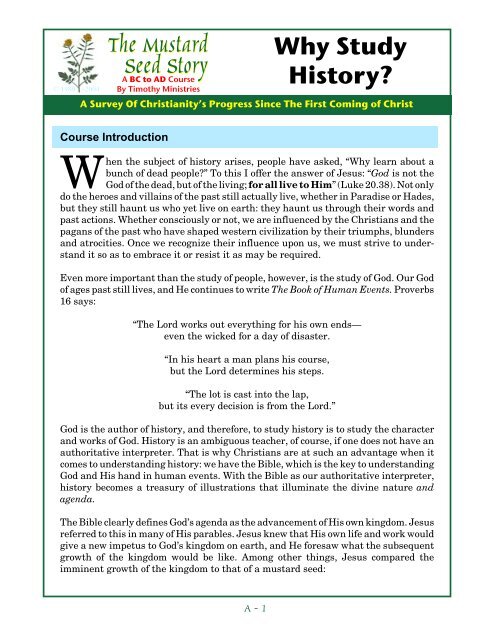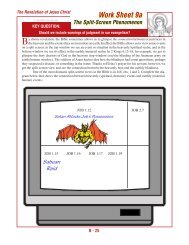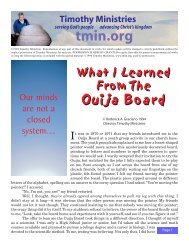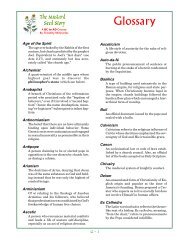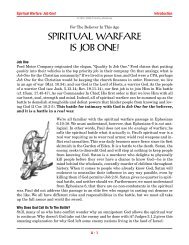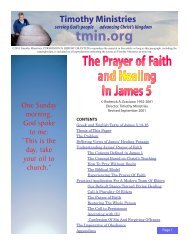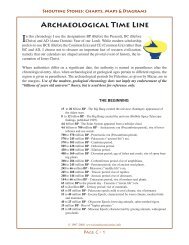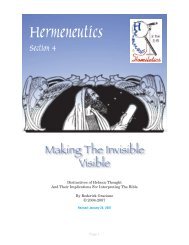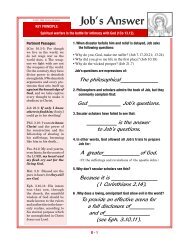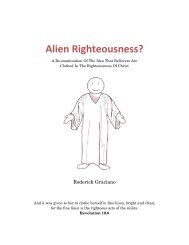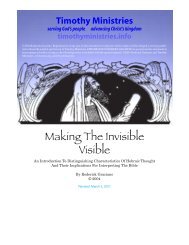The Mustard Seed Story The Mustard Seed Story - Timothy Ministries
The Mustard Seed Story The Mustard Seed Story - Timothy Ministries
The Mustard Seed Story The Mustard Seed Story - Timothy Ministries
You also want an ePaper? Increase the reach of your titles
YUMPU automatically turns print PDFs into web optimized ePapers that Google loves.
© 1989 -2004<br />
<strong>The</strong> <strong>Mustard</strong><br />
<strong>Seed</strong> <strong>Story</strong><br />
A BC to AD Course<br />
By <strong>Timothy</strong> <strong>Ministries</strong><br />
Why Study<br />
History?<br />
A Survey Of Christianity’s Progress Since <strong>The</strong> First Coming of Christ<br />
Course Introduction<br />
When the subject of history arises, people have asked, “Why learn about a<br />
bunch of dead people?” To this I offer the answer of Jesus: “God is not the<br />
God of the dead, but of the living; for all live to Him” (Luke 20.38). Not only<br />
do the heroes and villains of the past still actually live, whether in Paradise or Hades,<br />
but they still haunt us who yet live on earth: they haunt us through their words and<br />
past actions. Whether consciously or not, we are influenced by the Christians and the<br />
pagans of the past who have shaped western civilization by their triumphs, blunders<br />
and atrocities. Once we recognize their influence upon us, we must strive to understand<br />
it so as to embrace it or resist it as may be required.<br />
Even more important than the study of people, however, is the study of God. Our God<br />
of ages past still lives, and He continues to write <strong>The</strong> Book of Human Events. Proverbs<br />
16 says:<br />
“<strong>The</strong> Lord works out everything for his own ends—<br />
even the wicked for a day of disaster.<br />
“In his heart a man plans his course,<br />
but the Lord determines his steps.<br />
“<strong>The</strong> lot is cast into the lap,<br />
but its every decision is from the Lord.”<br />
God is the author of history, and therefore, to study history is to study the character<br />
and works of God. History is an ambiguous teacher, of course, if one does not have an<br />
authoritative interpreter. That is why Christians are at such an advantage when it<br />
comes to understanding history: we have the Bible, which is the key to understanding<br />
God and His hand in human events. With the Bible as our authoritative interpreter,<br />
history becomes a treasury of illustrations that illuminate the divine nature and<br />
agenda.<br />
<strong>The</strong> Bible clearly defines God’s agenda as the advancement of His own kingdom. Jesus<br />
referred to this in many of His parables. Jesus knew that His own life and work would<br />
give a new impetus to God’s kingdom on earth, and He foresaw what the subsequent<br />
growth of the kingdom would be like. Among other things, Jesus compared the<br />
imminent growth of the kingdom to that of a mustard seed:<br />
A - 1
<strong>Mustard</strong> <strong>Seed</strong> <strong>Story</strong><br />
He presented another parable to them, saying, “<strong>The</strong> kingdom of heaven is like a mustard seed,<br />
which a man took and sowed in his field; and this is smaller than all other seeds; but when<br />
it is full grown, it is larger than the garden plants, and becomes a tree, so that the birds of the<br />
air come and nest in its branches.” (Matthew 13.31,32) 1<br />
Christian history is the story of that mustard seed sprouting and growing over the<br />
course of the last 2,000 years. As we study its branching growth, its times of fruitfulness<br />
and times of infestation by “the birds,” we will not only learn about God and His agenda<br />
for this age, but also about how we can effectively join Him in His kingdom work and<br />
kingdom battles.<br />
We’ll see that to work and fight effectively for God’s kingdom, we’re going to have to set<br />
aside our spiritual provincialism. We have to resist the idea that we, and those in our<br />
particular religious neighborhood, are the ones who best know what Christianity is all<br />
about. I’ve been down that foolish path. When Christ saved me, I was a high-schooler<br />
in a dead, liberal church. What Christ did in my life was so different from anything I<br />
saw happening in the church people around me, it made me think I was the only real<br />
Christian in Tacoma, and that I had re-discovered the gospel for mankind. I soon found<br />
out that there were plenty of Christians around, and most of them much wiser and<br />
humbler than myself. You see, it’s easy to believe that we are the most spiritual,<br />
the most zealous, the most theologically correct until we expand our horizons<br />
and get to know Christians from other parts of town, and other parts of<br />
history. <strong>The</strong> <strong>Mustard</strong> <strong>Seed</strong> <strong>Story</strong> will provide a fresh set of criteria by which to examine<br />
ourselves and the vitality and integrity of our own spiritual lives.<br />
If we are willing to examine ourselves humbly, we will find history to be a kind teacher.<br />
It is much less painful to learn crucial lessons through the experiences of our<br />
predecessors, than to pay the price of learning the same lessons firsthand. Unfortunately,<br />
arrogance often keeps us from investigating the lessons of the past. Hegel said,<br />
“<strong>The</strong> one thing man learns from history, is that man learns nothing from<br />
history.” If we will swim against that current of human pride and come to the study<br />
of Christian history with a willingness to learn from the saints of an earlier day, we will<br />
find our investigation well rewarded, and wonder why we’ve waited until now to hear<br />
more of <strong>The</strong> <strong>Mustard</strong> <strong>Seed</strong> <strong>Story</strong>.<br />
1<br />
<strong>The</strong> mustard of the Bible, Mat. 13.31,32 and parallel passages, was probably black mustard,<br />
which grows to heights of 3.7m/12 ft in Israel.<br />
A - 2
© 1989 -2004<br />
<strong>The</strong> <strong>Mustard</strong><br />
<strong>Seed</strong> <strong>Story</strong><br />
A BC to AD Course<br />
By <strong>Timothy</strong> <strong>Ministries</strong><br />
Syllabus<br />
Orientation<br />
A Survey Of Christianity’s Progress Since <strong>The</strong> First Coming of Christ<br />
WorkSheets ------------------------------------------------------------------------------- Section B<br />
<strong>The</strong> instructor will provide a worksheet for participants before each class session.<br />
We will use these sheets for taking notes during each week’s presentation.<br />
Christian Centuries Chronology -------------------------------------------------- Section C<br />
During our study of the <strong>Mustard</strong> <strong>Seed</strong> <strong>Story</strong>, we will make regular reference to<br />
these time lines in order to associate the events we discuss with their contemporaneous<br />
events in “secular” history.<br />
Ancient Documents ------------------------------------------------------------------- Section D<br />
<strong>The</strong> best way to study church history—for the person who can prioritize the time—<br />
is to read the original accounts and treatises of the people who lived it. We’ve<br />
provided a few samples of ancient documents in this syllabus, both in order to refer<br />
to them in the course of our study, and to whet your appetite for more from the<br />
treasury of past Christian writings.<br />
Charts and Articles -------------------------------------------------------------------- Section E<br />
We will make reference to these pages as we refer to different sects that have arisen<br />
in Church history, and to historic church councils that have influenced the course<br />
of Christianity.<br />
List of Books and Other Resources ---------------------------------------------- Section F<br />
Superscript numbers in the Christian Centuries Chronology and other parts of the<br />
syllabus refer to this list. Should you be interested in reading any of these books,<br />
and need help locating a copy, we may be able to help.<br />
Glossary ---------------------------------------------------------------------------------- Section G<br />
Please refer to the Glossary for unfamiliar terms that you may hear in the course<br />
of our discussions.<br />
Our background textbook for this study is<br />
Justo González’s <strong>The</strong> <strong>Story</strong> of Christianity,<br />
available online, in one volume from<br />
ChristianBook.com.<br />
A - 3
<strong>Mustard</strong> <strong>Seed</strong> <strong>Story</strong><br />
“Tell me more about this Christianity of yours. I’m terribly interested.”<br />
A - 4


